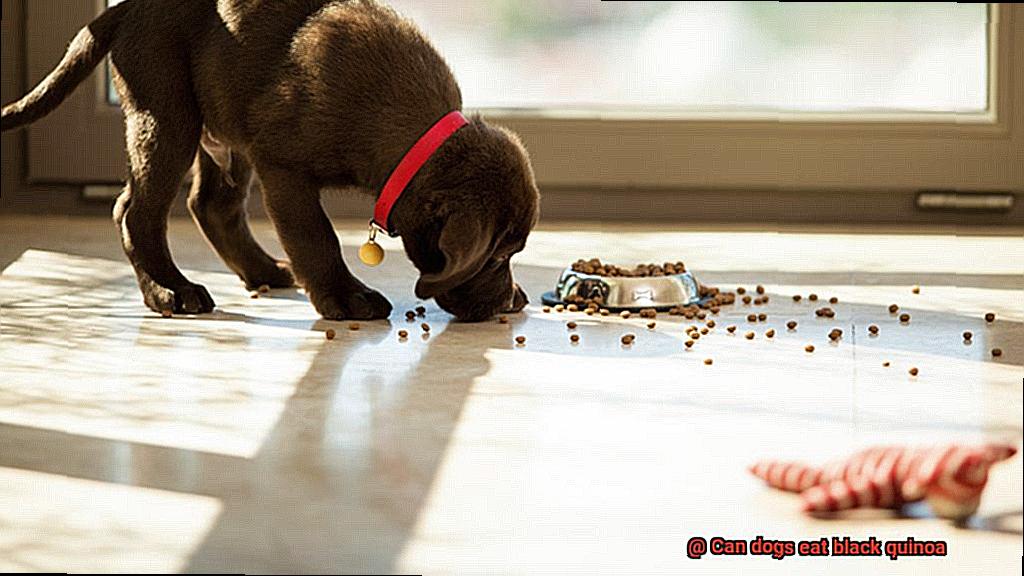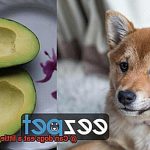Can dogs eat black quinoa?
Welcome to our blog, where we dive into the fascinating world of canine nutrition. Today, we’re tackling a hot topic that has everyone buzzing – black quinoa. But hold your horses, can our furry friends chow down on this trendy grain too?
Quinoa, oh quinoa, the superhero of grains. Packed with protein, fiber, and essential amino acids, it’s become a go-to choice for health-conscious humans. But what about our four-legged pals? Should we be throwing some black quinoa their way or hitting the brakes? Let’s dig in and find out.
Black quinoa might catch your eye with its mysterious allure and less common appearance. And hey, it does have some potential benefits for dogs. Protein helps those muscles grow strong like tree trunks while fiber keeps digestion on track and waistlines in check. Sounds pretty good, right? You might be tempted to sprinkle some black quinoa in your pup’s bowl.
But wait just a minute. Dogs aren’t carbon copies of humans when it comes to nutrition. Sure, black quinoa might have its perks, but it should only be given in moderation alongside a well-balanced diet specifically formulated for dogs.
And here’s another wrinkle: not all dogs are equal when it comes to digesting quinoa. Some pups may struggle with tummy troubles after munching on these tiny grains. And let’s not forget about those sneaky oxalates lurking around in black quinoa – they could potentially lead to kidney stones in certain breeds who are more prone to them. Yikes.
So before you go all-in on the black quinoa bandwagon for your pooch, make sure you consult with your trusty veterinarian first. They’ll help you navigate the ins and outs of introducing new foods into your dog’s diet without any hiccups.
In conclusion, black quinoa isn’t off-limits for dogs entirely. It does have some nutritional benefits to offer. But as responsible pet parents, we need to approach it with caution and moderation. Remember, always consult with your vet to ensure that black quinoa is a good fit for your dog’s unique dietary needs and health conditions. Stick around as we delve deeper into the world of canine nutrition and uncover more hidden gems along the way.
Is Black Quinoa Safe for Dogs?
Contents
- 1 Is Black Quinoa Safe for Dogs?
- 2 What are the Nutritional Requirements for French Bulldogs?
- 3 How to Prepare Black Quinoa for Dogs?
- 4 What are the Potential Benefits of Feeding Black Quinoa to French Bulldogs?
- 5 What are the Risks of Feeding Black Quinoa to French Bulldogs?
- 6 Is Too Much Black Quinoa Bad for Dogs?
- 7 Are There Alternatives to Feeding French Bulldogs Black Quinoa?
- 8 Tips on Introducing Black Quinoa into a Dog’s Diet Gradually
- 9 Conclusion
Are you considering adding black quinoa to your French Bulldog’s diet? As an expert in pet nutrition, I’m here to provide you with the information you need to make an informed decision. Black quinoa is a type of grain that is gaining popularity among health-conscious individuals due to its high nutritional value. But is it safe for dogs?
The short answer is yes, black quinoa can be safe for dogs to consume. However, there are some important considerations to keep in mind before feeding it to your furry friend.
- High Fiber Content: Black quinoa is known for its high fiber content, which can be beneficial for humans but may cause digestive upset in some dogs. It is recommended to start with small amounts and monitor your dog’s reaction closely if you’re introducing quinoa to their diet for the first time.
- Nutritional Needs: Dogs have different nutritional needs than humans, and their bodies may not be able to fully digest and absorb all the nutrients from quinoa. Therefore, it should not replace a balanced dog food diet but rather be offered as an occasional addition or treat.
- Proper Preparation: It is crucial to ensure that the black quinoa is cooked thoroughly before feeding it to your dog. Raw or undercooked grains can be difficult for them to digest and may cause gastrointestinal issues. Additionally, avoid using any seasonings or additives that may be harmful or toxic to dogs.
- Veterinary Consultation: As always, it is best to consult with your veterinarian before introducing any new foods into your dog’s diet, including black quinoa. They can provide personalized advice based on your dog’s age, breed, health condition, and dietary needs.
In conclusion, while black quinoa can be safe for dogs when prepared and fed properly, it should not replace a balanced dog food diet. It should only be offered as an occasional treat or supplement to their regular meals. Remember to consult with your veterinarian and monitor your dog’s response when introducing any new food to their diet.
What are the Nutritional Requirements for French Bulldogs?
French Bulldogs are undeniably adorable with their squishy faces and playful personalities. But did you know that they also have specific nutritional requirements to keep them healthy and thriving? As an expert in pet nutrition, I’m here to spill the kibble on what you need to know about feeding your French Bulldog.
- Protein Powerhouse: French Bulldogs need a diet rich in high-quality animal-based proteins. Chicken, beef, and fish are excellent sources of protein that help build and repair tissues, support their immune system, and provide energy. Just make sure to choose lean cuts of meat to prevent excessive fat intake.
- Carbohydrate Choices: Carbohydrates are an important energy source for French Bulldogs. Opt for complex carbohydrates like whole grains (rice, oats) and vegetables to ensure a steady release of energy and avoid blood sugar spikes. Stay away from simple carbohydrates like white bread or sugary treats, as these can lead to weight gain and other health issues.
- Fats for Fluffiness: Healthy fats are essential for French Bulldogs as they provide energy, aid in nutrient absorption, and support a luscious coat. Incorporate sources like fish oil, flaxseed oil, and coconut oil into their diet. Avoid high-fat foods like fried treats or fatty cuts of meat to prevent obesity.
- Vitamins and Minerals: French Bulldogs need a variety of vitamins and minerals to support their overall health. While a balanced diet should provide most of these nutrients, some may require supplementation. Consult with your veterinarian to determine if additional supplements are necessary for your furry friend.
- Hydration Station: Water is often overlooked but is an essential nutrient for French Bulldogs. Proper hydration helps regulate body temperature, aids digestion, and supports all bodily functions. Be sure to provide fresh and clean water throughout the day.
Remember, meeting the nutritional requirements of your French Bulldog is crucial for their health and well-being. A balanced diet that includes high-quality proteins, complex carbohydrates, healthy fats, and a variety of vitamins and minerals is key. And don’t forget about hydration. Consult with your veterinarian for personalized advice and to ensure your French Bulldog receives the best possible nutrition. Now go give your furry friend a delicious and nutritious meal – they deserve it.
How to Prepare Black Quinoa for Dogs?
Consider black quinoa. This grain is packed with protein, fiber, and essential nutrients that can benefit your furry friend. However, it’s important to prepare black quinoa properly to ensure it’s safe and enjoyable for your dog. In this article, we’ll guide you through the steps of cooking, serving, and considering safety when preparing black quinoa for your French Bulldog.
Rinsing the Quinoa:
Before cooking black quinoa for your dog, it’s crucial to rinse it thoroughly. This step removes any dirt or debris that may be present. Place the quinoa in a fine-mesh sieve and rinse it under cold running water until the water runs clear. This simple step helps ensure that your dog’s quinoa is clean and ready to cook.
Cooking the Quinoa:
To cook black quinoa, you’ll need a ratio of two parts liquid (water or broth) to one part quinoa. Bring the liquid to a boil in a saucepan, then add the rinsed quinoa. Reduce the heat to low, cover the pan, and let it simmer for around 15 minutes or until the quinoa is tender and has absorbed all the liquid. Cooking black quinoa is similar to cooking rice—easy peasy.
Allowing it to Cool:
Once the black quinoa is cooked, allow it to cool completely before serving it to your French Bulldog. Hot food can cause burns or discomfort in their mouth or throat. To speed up the cooling process, spread the cooked quinoa on a baking sheet or shallow dish and let it sit at room temperature until cool.
Introducing Black Quinoa Gradually:
When introducing black quinoa into your French Bulldog’s diet, start with small portions. Begin by adding a tablespoon or two of cooked quinoa to their regular food. Monitor your dog’s reaction and gradually increase the portion size over time. This gradual approach allows their digestive system to adjust and minimizes the risk of any adverse reactions.
Keeping it Plain and Simple:
When preparing black quinoa for your French Bulldog, avoid seasoning it with spices or additives that may be harmful to dogs. Plain, unseasoned black quinoa is the best option for your furry friend. You can add lean protein, such as boiled chicken or turkey, and some cooked vegetables to create a balanced and nutritious meal.
What are the Potential Benefits of Feeding Black Quinoa to French Bulldogs?
And when it comes to their diet, finding nutritious and delicious options is key. Enter black quinoa – a superfood grain that can bring a whole range of potential benefits to your French Bulldog’s health. Let’s dive into the exciting world of black quinoa and discover why it might just be the perfect addition to your pup’s bowl.
Protein-packed goodness:
French Bulldogs need protein to thrive, and black quinoa delivers. Packed with this vital nutrient, black quinoa supports muscle development and growth in your furry companion. It’s like hitting the gym for your pup’s muscles without actually going to the gym.
Digestion made easy:
Does your French Bulldog have a sensitive stomach or experience digestive issues? Black quinoa might be the answer you’ve been looking for. Thanks to its high dietary fiber content, black quinoa can aid digestion and promote regular bowel movements. Say goodbye to tummy troubles.
A treasure trove of vitamins and minerals:
Black quinoa is like a pot of gold when it comes to essential vitamins and minerals. It’s loaded with iron, magnesium, phosphorus, and potassium – all crucial for maintaining healthy bones, teeth, immune system, and proper nerve and muscle function in your French Bulldog. It’s like a multivitamin for your pup.
Blood sugar under control:
If your French Bulldog has diabetes or is at risk of developing it, black quinoa can be a game-changer. With its low glycemic index, this grain causes a slow and steady rise in blood sugar levels, keeping them stable. It’s like having an internal blood sugar stabilizer for your pup.
Gluten-free goodness:
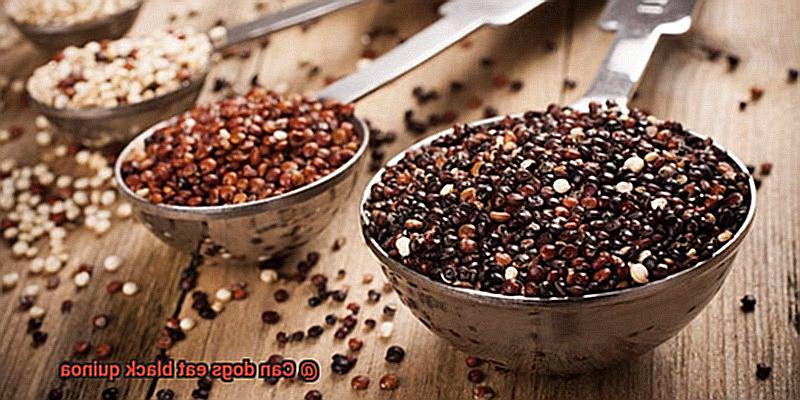
Does your French Bulldog have gluten sensitivities or allergies? Fear not. Black quinoa is gluten-free, making it a safe and healthy alternative to other grains. No more tummy troubles or allergic reactions – just pure satisfaction for your pup’s taste buds.
Remember:
While black quinoa offers numerous potential benefits, it’s important to introduce it gradually and monitor your French Bulldog’s response. Some dogs may have difficulty digesting grains or may be allergic to certain components of quinoa. Always consult with your veterinarian before making any significant changes to your pup’s diet and follow their guidance on portion sizes and frequency of feeding black quinoa.
With its protein-packed goodness, digestion-friendly fiber, essential vitamins and minerals, blood sugar control, and gluten-free nature, black quinoa is a superhero grain for French Bulldogs. Your pup will thank you for adding this nutrient-rich powerhouse to their bowl.
So, go ahead and unleash the power of black quinoa in your French Bulldog’s diet – they’ll be living their best, healthiest life in no time.
What are the Risks of Feeding Black Quinoa to French Bulldogs?
French Bulldogs are beloved pets known for their unique personalities and adorable looks. As responsible pet owners, it is crucial to understand the risks associated with feeding certain foods to our furry friends. In this article, we will explore the potential dangers of feeding black quinoa to French Bulldogs, taking into account their specific dietary needs and sensitivities.
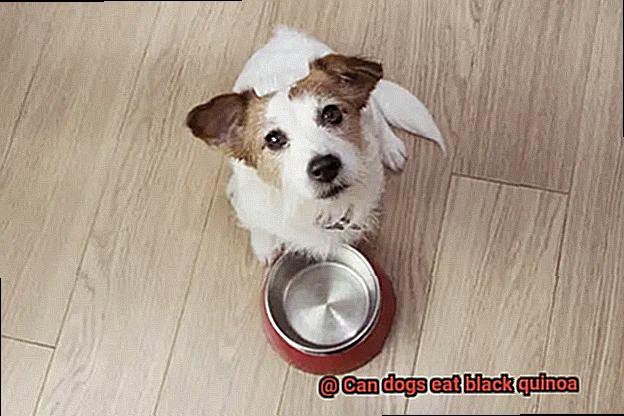
High Fiber Content:
Black quinoa is a nutritious grain that contains a significant amount of fiber. While fiber is essential for maintaining a healthy digestive system in dogs, excessive amounts can cause gastrointestinal issues such as bloating, gas, and diarrhea. French Bulldogs are prone to digestive problems, so introducing a high-fiber grain like black quinoa may exacerbate these issues.
Allergies and Sensitivities:
Although quinoa is generally safe for dogs, individual canines may have adverse reactions to it. French Bulldogs are known for their sensitive stomachs and can be susceptible to food allergies.
Introducing black quinoa into their diet may trigger allergic reactions such as itching, skin rashes, or digestive upset. It is important to monitor your Frenchie closely for any signs of allergies or sensitivities when incorporating black quinoa into their meals.
Presence of Saponins:
Black quinoa contains saponins, natural compounds that can cause irritation in the gastrointestinal tract. While most saponins are removed during processing, trace amounts may still remain in the grain. These saponins can lead to stomach upset and discomfort in French Bulldogs, particularly those with sensitive stomachs.
Limited Research:
Black quinoa is a relatively new addition to the canine diet, and there is limited scientific research on its long-term effects on dogs. Without sufficient evidence, it is challenging to determine the potential risks associated with feeding black quinoa specifically to French Bulldogs. It is always best to consult with a veterinarian before making any significant changes to your dog’s diet.
Conclusion:
While black quinoa may offer some health benefits, it is important to consider the risks when feeding it to French Bulldogs. The high fiber content, potential for allergies or sensitivities, and the presence of saponins should be taken into account.
To minimize these risks, introduce new foods gradually and monitor your Frenchie for any adverse reactions. Always consult with a veterinarian to ensure your dog’s overall health and well-being.
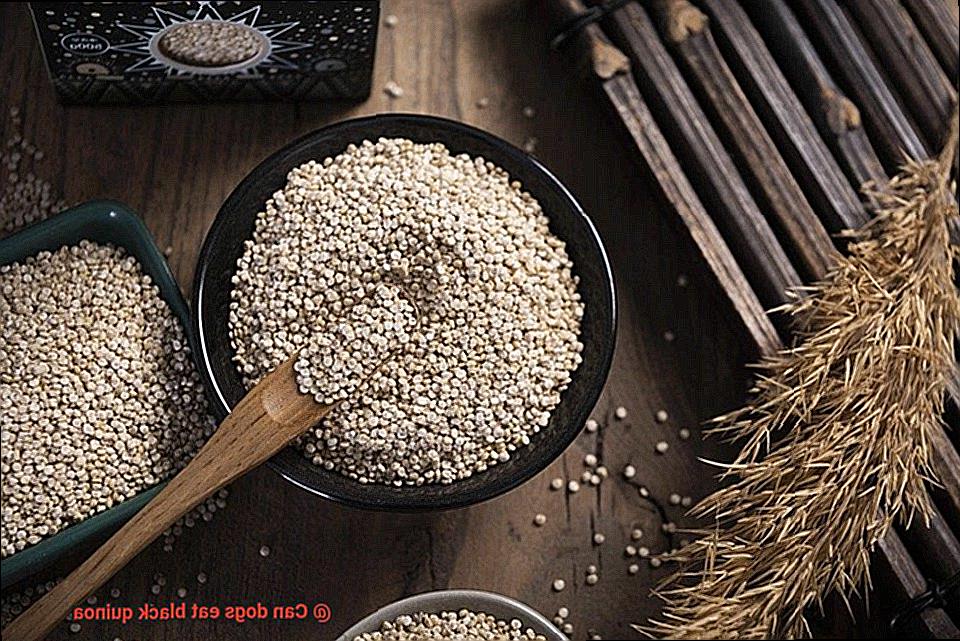
Is Too Much Black Quinoa Bad for Dogs?
In this eye-opening article, we delve into the potential dangers of feeding black quinoa to French Bulldogs, considering their specific dietary needs and sensitivities. From the high fiber content that can cause tummy troubles to the possibility of allergies and sensitivities, not to mention those pesky saponins that can irritate their delicate stomachs, there’s a lot to consider before introducing this trendy grain into your furry friend’s diet.
And let’s not forget the limited research on the long-term effects – it’s always best to consult with a veterinarian first. So, while black quinoa may offer some health benefits, it’s crucial to weigh the risks and take precautions when it comes to our precious Frenchies.
Research has shown that black quinoa is a nutritious grain that is safe for dogs to consume in moderation. It is a good source of protein, fiber, and essential nutrients. However, it is important to note that dogs have different dietary needs than humans, and their digestive systems are not designed to process certain foods, including large amounts of grains.
Dogs have a limited ability to digest grains, and too much black quinoa can cause digestive upset. This can manifest as bloating, gas, diarrhea, or even constipation. Additionally, black quinoa contains saponins, which are natural compounds that can cause irritation to the digestive system if consumed in large quantities.
To introduce black quinoa into a dog’s diet safely, it is recommended to start with small amounts and monitor their response. Gradually increase the quantity over time if there are no adverse reactions. It is also crucial to cook black quinoa thoroughly before feeding it to dogs, as raw or undercooked grains can be difficult for them to digest.
While black quinoa can be a healthy addition to a dog’s diet in moderation, it is essential to monitor their intake and watch for any negative reactions. It is always best to consult with a veterinarian before adding black quinoa or any other new ingredient to your dog’s diet.
Are There Alternatives to Feeding French Bulldogs Black Quinoa?
French Bulldogs are beloved companions known for their unique personalities and charm. As responsible dog owners, it’s essential to provide them with a balanced diet that meets their specific nutritional needs. While black quinoa may be a healthy choice for humans, it’s important to explore alternative options that cater to our furry friends. In this article, we’ll delve into some nutritious alternatives to feeding French Bulldogs black quinoa, ensuring they receive the nutrients they need without compromising their health.
Alternative 1: Brown Rice
Brown rice is a commonly used ingredient in many commercial dog foods due to its digestibility and nutrient content. It offers carbohydrates for energy and contains essential vitamins and minerals. You can cook brown rice thoroughly and serve it as a side dish to your French Bulldog’s regular diet.
Alternative 2: Sweet Potatoes
Sweet potatoes are a fantastic alternative to quinoa, packed with vitamins, minerals, and fiber. They are gentle on the digestive system and can be cooked, mashed, and mixed with your French Bulldog’s regular food or served as a standalone treat. Just make sure to avoid seasoning or adding any harmful ingredients like onions or garlic.
Alternative 3: Oats
Oats are another excellent option for French Bulldogs. They are naturally gluten-free and rich in fiber, providing both soluble and insoluble fibers that aid digestion. Oats can be cooked with water or low-sodium broth and added to your furry friend’s regular meals.
Alternative 4: Lean Proteins
Protein is an essential component of a French Bulldog’s diet. Instead of relying solely on quinoa for protein, consider incorporating lean proteins like chicken, turkey, or fish into their meals. These protein sources offer necessary amino acids for muscle development and overall health.
Alternative 5: Fresh Fruits and Vegetables
Adding fresh fruits and vegetables to your French Bulldog’s diet can provide essential vitamins, minerals, and antioxidants. Examples include blueberries, carrots, green beans, and pumpkin (which can also aid digestion). Ensure that you feed them in moderation and avoid toxic fruits such as grapes or raisins.
Consulting a Veterinarian:
Before making any significant changes to your French Bulldog’s diet or introducing new ingredients, it is crucial to consult with a veterinarian. They can provide tailored advice based on your dog’s specific needs, considering factors such as age, weight, and any existing health conditions.
Tips on Introducing Black Quinoa into a Dog’s Diet Gradually
Packed with protein, fiber, vitamins, and minerals, black quinoa is a nutritious grain that can be a great addition to your dog’s meals. However, it’s crucial to introduce it gradually and with care to ensure your furry friend’s digestive system adjusts well. In this article, we’ll guide you through the process of introducing black quinoa into your French Bulldog’s diet gradually and safely.
Gradual Introduction:
When it comes to introducing any new food, whether it’s for humans or dogs, gradual is the way to go. Start by cooking a small amount of black quinoa according to the package instructions. Remember not to add any seasoning or oil. Once cooked, allow it to cool completely before feeding it to your French Bulldog.
Monitor for Allergies or Sensitivities:
Just like humans, dogs can have allergies or sensitivities to certain foods. Keep a close eye on your French Bulldog during the transition period for any signs of an adverse reaction. If you notice itching, diarrhea, vomiting, or excessive gas, stop feeding black quinoa and consult your veterinarian.
Cooked and Unseasoned:
Cooking black quinoa thoroughly is essential before serving it to your French Bulldog. Raw quinoa can be difficult for dogs to digest and may cause stomach issues. Additionally, make sure the black quinoa is plain and free from any seasonings, spices, or additives that could be harmful to your dog.
Portion Control:
While black quinoa is nutritious, moderation is key. Consult with your veterinarian to determine the appropriate portion size based on your French Bulldog’s size, age, and activity level. Too much quinoa can lead to digestive upset or weight gain, so it’s important to feed it in the right quantities.
Mix with Familiar Foods:
To ease your French Bulldog into the new taste and texture of black quinoa, mix small amounts of it with their regular food. Start with a small ratio of one part black quinoa to four parts regular food. Gradually increase the proportion of quinoa over time, allowing your dog to adjust at their own pace.
nBlvFJq6-is” >
Conclusion
In conclusion, it is safe for dogs to eat black quinoa in moderation.
This nutrient-rich grain can provide them with essential vitamins and minerals. However, it is important to remember that dogs have different dietary needs than humans.
Always consult with your veterinarian before introducing any new food into your dog’s diet to ensure their health and well-being.
